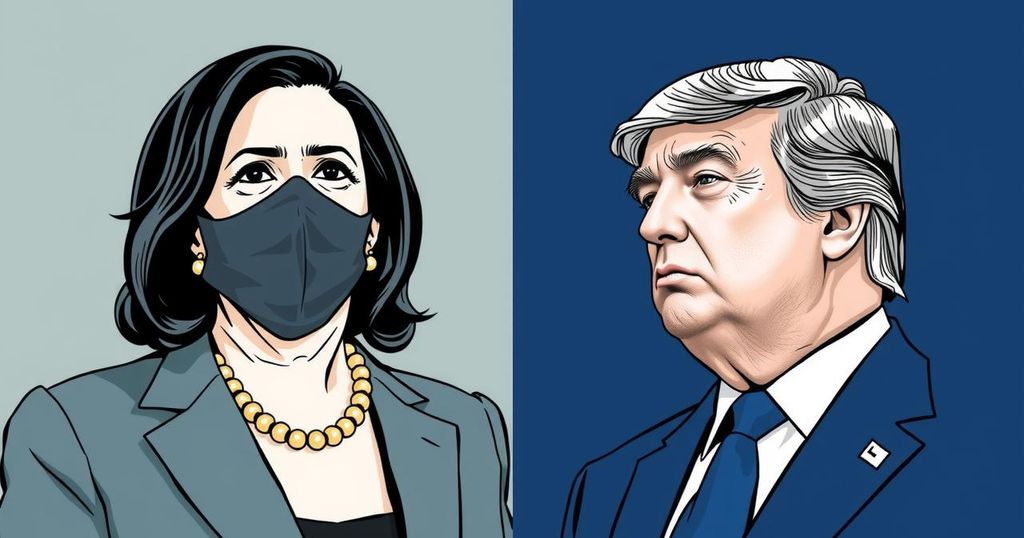International Relations Experts Highlight Key Differences Between Harris and Trump Regarding U.S. Foreign Policy

International relations experts foresee significant differences in foreign policy between Kamala Harris and Donald Trump in the upcoming 2024 presidential election. A survey of 705 scholars indicates that Trump poses a higher risk for withdrawing from international agreements, while Harris is expected to enhance military aid to allies and maintain U.S. participation in global institutions. Experts overwhelmingly endorse Harris as the more effective leader in managing foreign policy issues.
As the 2024 U.S. presidential election approaches, international relations experts predict significant disparities between the foreign policy approaches of Vice President Kamala Harris and former President Donald Trump. A survey conducted by the Teaching, Research, and International Policy Project at William & Mary’s Global Research Institute, with support from the Carnegie Corporation of New York, revealed assessments from 705 international relations scholars regarding the election’s impact on U.S. foreign policy. The experts foresee pronounced policy differences, particularly in areas such as climate change, NATO membership, nuclear cooperation with Iran, trade, and foreign assistance. They anticipate that Trump would likely withdraw from the Paris Agreement with an 80 percent likelihood and from NATO with a 38 percent chance, whereas Harris would present only a 4 percent chance for withdrawal from both. On nuclear agreements with Iran, scholars estimate a 35 percent probability under Harris versus merely a 7 percent under Trump. Furthermore, regarding trade tariffs, there is an 80 percent chance that Trump would increase tariffs compared to a 30 percent likelihood for Harris. Notably, the experts predict an increase in U.S. foreign aid under a Harris administration at 56 percent likelihood, while only 20 percent under Trump. Expert predictions also extend to military assistance, indicating a 75 percent probability that Trump would increase military aid to Israel, compared to 54 percent under Harris. However, Harris is considered more favorable towards increasing military aid to Ukraine amidst its conflict with Russia, with a likelihood of 63 percent compared to 16 percent under Trump. Despite some small overlapping predictions on military force usage, with Trump suggested to be slightly more restrained, experts remain divided. Many believe that the election outcomes may not drastically affect the overall military force deployment by the United States. Moreover, the IR scholars express a substantial lack of confidence in Trump’s foreign policy management capabilities, with 92 percent selecting Harris as the more competent candidate. This is echoed by a 87 percent confidence in Harris’s command abilities, contrasted starkly with a mere 6 percent confidence in Trump. Thirty percent of surveyed Republican experts indicated they would vote for Harris, demonstrating cross-party concerns regarding Trump’s effectiveness. In general, the IR community sees Harris as a considerably more capable steward of U.S. foreign policy, believing that the election on November 5 will significantly influence America’s standing and approach on the global stage.
The article discusses the anticipated impact of the 2024 presidential election on U.S. foreign policy as assessed by international relations experts. With the election not placing significant emphasis on foreign policy, scholars argue that its outcome is of utmost importance. A survey conducted by the Teaching, Research, and International Policy Project provided insights into how Harris and Trump diverge in their foreign policy approaches, particularly regarding international agreements and military assistance. The predictions made by experts highlight the stark contrasts in vision and capabilities between the two candidates.
The survey results indicate that international relations experts overwhelmingly favor Kamala Harris over Donald Trump in terms of foreign policy competence and effectiveness. The anticipated differences in foreign policy, particularly regarding alliance maintenance, tariff policies, and military assistance, suggest that the choice of president on November 5 will have significant ramifications for U.S. foreign relations and global standing. Harris is viewed as a leader likely to facilitate greater cooperation from foreign governments, contrasting sharply with concerns regarding Trump’s ability to navigate international challenges.
Original Source: foreignpolicy.com






